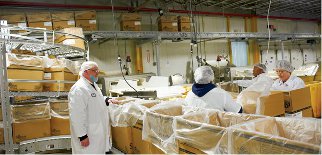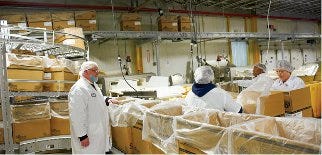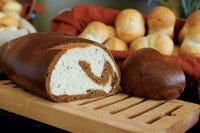Signature Breads: Energized by automation
January 29, 2014

It seems counterintuitive for a startup to come preloaded with a long-tenured labor force and fully functional plant. But for all intents and purposes, it was a startup that a group of employee investors were getting when they acquired the plant in Chelsea, Mass. from General Mills.
The bakery itself has been in existence since 1981, originally making a variety of products under the banners Signature Breads and Rudi's. A European company purchased the bakery in order to introduce par-baking to the United States, and the plant became ground zero for the par-baked revolution and the birthplace of the well-known Rudi Roll. But when Pillsbury and General Mills later purchased the bakeries in the mid-90s, the Signature Breads brand was shed-though the Rudi's brand was spared. Since, the plant had been operating only as a production facility with no dedicated sales or marketing forces.
With employees that had been there since the start, the cupboards were hardly bare when the employee shareholders purchased the plant in 2006. But plenty of work needed to be done.
"At first it was just about learning the nuts and bolts of survival-making consistent products, getting the trucks out the door and putting an organization together," says Christine Colwell, senior vice president, sales and marketing. "We had operated as a plant and only a plant for many years. We had to become a business, and that was a big leap."
Now, five years later, the company has turned a corner. Signature Breads has established its own unique culture, has expanded its satellite plant in Phoenix to aid in national distribution, and has reached a critical mass of both resources and demand that allows for capital investment back into its plant with a focus on automation.

Signature Bread packaging system installation
Automating for growth
Signature Breads recently finished a comprehensive installation of a new packaging system, a sheeted dough line and a roll and round machine. The project was designed to help drive costs out of products and increase productivity.
"There are different moving parts within the plans," says Kevin Helman, director, supply chain operations. "In the packaging area, it was focused on automating the more manual spots on the line, like the box erection room. On the front end of the process, our goal was to advance the technology and throughput while enhancing the overall quality. On the packaging end, it was more of a labor savings investment."
Recognizing that they didn't have the resources of the much larger companies that previously controlled the plant, Helman and the project team did a lot of the engineering and planning in-house with support from a few outside vendors. "It was a collaborative effort; we had worked with the vendor before, so they understood our plant," Helman says. "Our two companies worked really well on implementing this project."
The company started with packaging because it had one of the more compelling business cases behind it, and one of the quicker returns on investment (ROI) of potential projects at only two years from launch.
"And that timeframe was based on current volume; if the company grows, we'll realize ROI even quicker," Helman adds. "At this point we're still in start-up phase, and our potential hasn't been fully reached, but we're ahead with product quality already."
The gains in quality have come from the front end lines, primarily in the ability to increase dough hydration, making for better performing doughs while producing a higher yield. The capabilities of the new line all but replaced two existing lines, saving on floor space and enabling the company to look into installing another line. When planning, the team tried to gain synergies by keeping production in one room and allowing for better coordination between maintenance, sanitation, quality and all the support staff.
"A lot of it was project productivity minded, but we also focused on improving the workplace through ergonomic improvements," Helman adds. The packaging line forms and delivers boxes in to be filled at an angle that minimizes or eliminates back stress for line workers. Long-tenured employees like those at Signature Breads are valuable, and the ergonomic element was an investment in health and wellness that Helman hopes will pay incalculable dividends by keeping employees on the line.
The project was the largest productivity project that Signature Breads has undertaken, but Helman suggests that it's the tip of the iceberg when it comes to automation.
"We have a productivity pipeline that we're filling with concepts and projects right now," he says. "As we develop those, they are pitched to directors and senior management team for approval. We expect more productivity projects by the end of the year or the first part of 2012."
Core competencies
Signature Breads produces 126 SKUs of bread and rolls, most notably the original Rudi Roll-a classic, European-styled dinner roll that helped to popularize par-baking in the United States. Tim Konicek, director of quality and R&D, was with Signature Breads in its formative days, when the Rudi Roll was introduced.
"The French company that owned Signature Breads wanted to use us to make inroads in the U.S., to break through the barriers of selling par-baked bread in the U.S.," he says. "The Rudi Roll is iconic. Many dinners roll you get at a hotel banquet or in a restaurant bread basket is either a Rudi Roll or a copy of it."

Signature Bread marble rye
Because the Rudi Roll was such a cornerstone of Signature Breads, the partners were careful to acquire the Rudi's brand along with the plant.
The company's core products-and top sellers-are par-baked traditional French white breads and rolls. Flavored breads are on the second tier of popularity, and some fully baked items are starting to gain traction.
"One item that we have changed, and we've put a ton of work into, has been the ciabatta," Colwell says. "We've got some of the best ciabatta in the country. The feedback on it, and the sales which validate the feedback, has been extremely positive."
But most of the formulas are nearly the same as the ones imported from the erstwhile French owners in the 1980s. Konicek is cautious when making formula changes for fear of messing with success, and notes that even minor tweaks in formulas will elicit calls from customers.
Though he's hesitant to change successful existing products, Konicek and his team are constantly looking at new products that address consumer trends and customer demands. The company launches new products twice a year.
"We try to collaborate as closely with our customers as much as we possibly can. It doesn't really work to go out and invent something and expect them to buy it or use it; we need to partner with them and find out what they're looking for, what they want, and how they use it," Colwell says. "We can make French bread in any shape you want, but we need to know what the end customer wants."
Health and wellness
At Signature Breads, it all starts with great tasting, craft breads. The next step it to make those breads deliver against key consumer trends, and recently, the most impactful trends have been health and wellness.
The company addressed the reduced sodium craze by reducing salt in its top 10 selling products by 10 percent. It was a way to position the company as forward thinking in terms of providing solutions.
After researching other companies that had done it, Signature Breads determined it could retain the integrity of the product while incrementally decreasing sodium levels. The 10 percent figure resonated with customers, and the transition was seamless.
"We wanted to see what we could do without affecting the formula a lot, just minimize the salt. We asked ourselves ‘How much can we cut out before we start noticing a difference in flavor and texture?'" Konicek says. "Some people have gone the potassium chloride route, but then people might start to worry about rising potassium levels, so we went with reduction instead of replacement."
This mirrors the way the government is looking at sodium reduction, asking for a gradual phasing out of sodium gradually over time so people can get used to the difference, rather than requiring drastic cuts.
"We've done a lot of work with key customers, particularly in the college and university segment, and we use them to really give us a pulse on future trends. Between that and our own internal research, one of the things that we saw was reduced calorie products."
The colleges and universities were saying they needed sandwiches containing fewer than 500 calories. With that ceiling in mind, the bakery rolled out a low calorie line of products, all under 300 calories per serving. Some of the products it was making were already low calorie, and a few others needed minor tweaking to get there.
"It's important that we aren't just serving half a roll and calling it a full serving," Konicek adds. "And we aren't substituting artificial sweeteners or anything; we adjust the serving size to meet calorie targets.
All natural is another area of interest for Signature Breads. The company always had a portfolio of all natural products, but it wasn't marketing them as such until three years ago, when it was able to identify nearly 25 all natural products already in its lineup.
"And that leads into the next trend, and that's clean label," Colwell says. "If you look at our labels, just across the board, they're pretty clean. That's one of our points of difference, and its what we feel is part of our signature solutions for our customers. Customers are getting savvy. Nutritionals are a huge concern for them."
Though Signature Breads' core products use dough conditioners, and that's difficult to change at this point, clean label is a direction Konicek is looking into, as well as formulating new products to add to the all natural line.
Many of Signature Breads' products carry the whole grain stamp, as well. Though the primary end consumer is usually in a foodservice setting and may not be closely reading labels or seeking out stamps, Colwell finds that foodservice operators increasingly prefer healthier items.
"One of our big customers mentioned that they really liked our access to nutritionals, labeling and our focus on health," she says. "I think our operators are getting pretty sophisticated and are looking for solutions in line with today's health and wellness trends. They might not market their bread basket at low calorie, but if they get the question from a guest, they are prepared for it."
According to Beth Cacciotti, marketing manager, for many operators, it comes down to providing a choice. Though consumers are saying they want more healthful products, that doesn't necessarily translate to more sales. Sometimes it's about flavor alone. "For us," she says, "if there's a way we can make something more healthful, and keep it tasting really good, that's the direction we're going."
This article is distributed by Penton Business Media
About the Author(s)
You May Also Like


